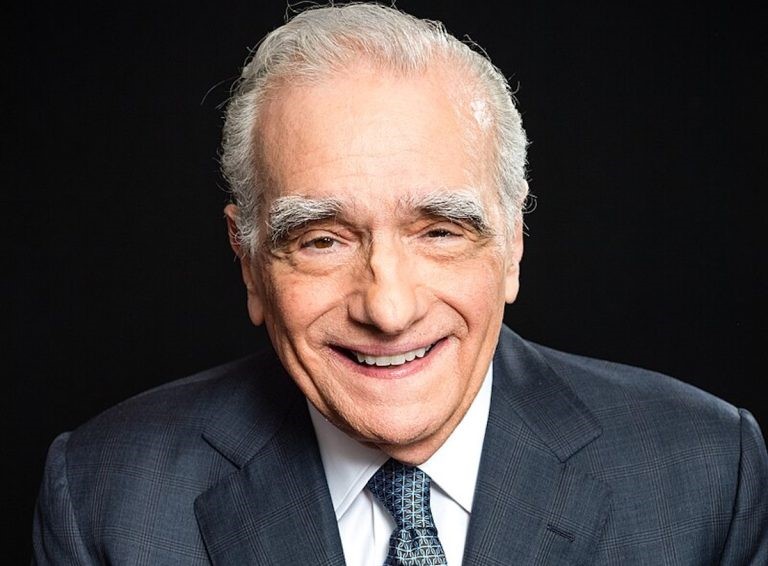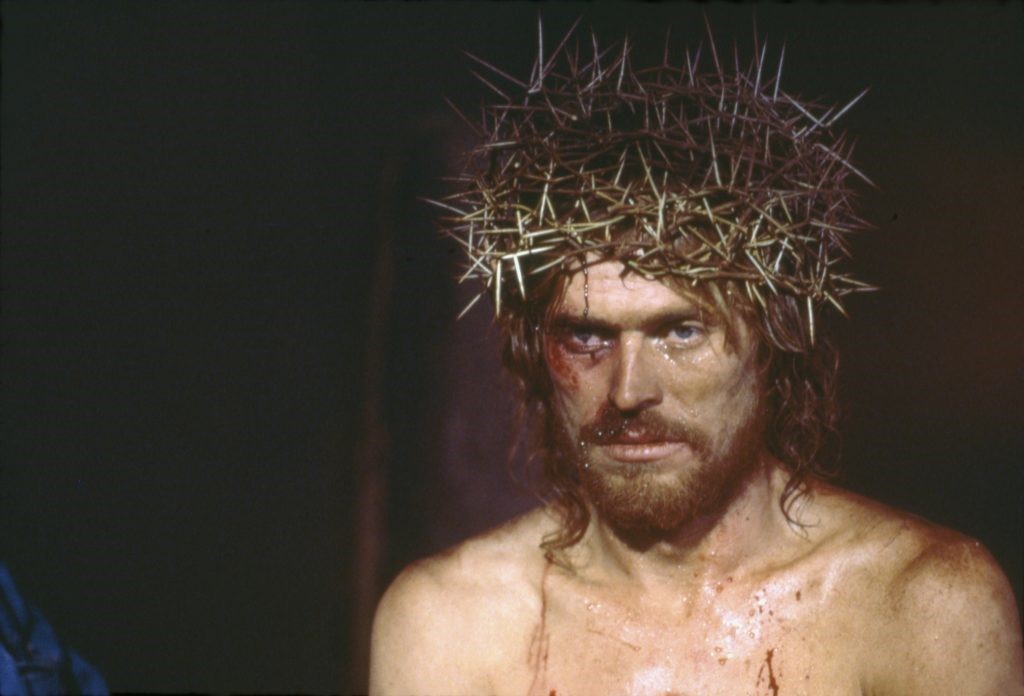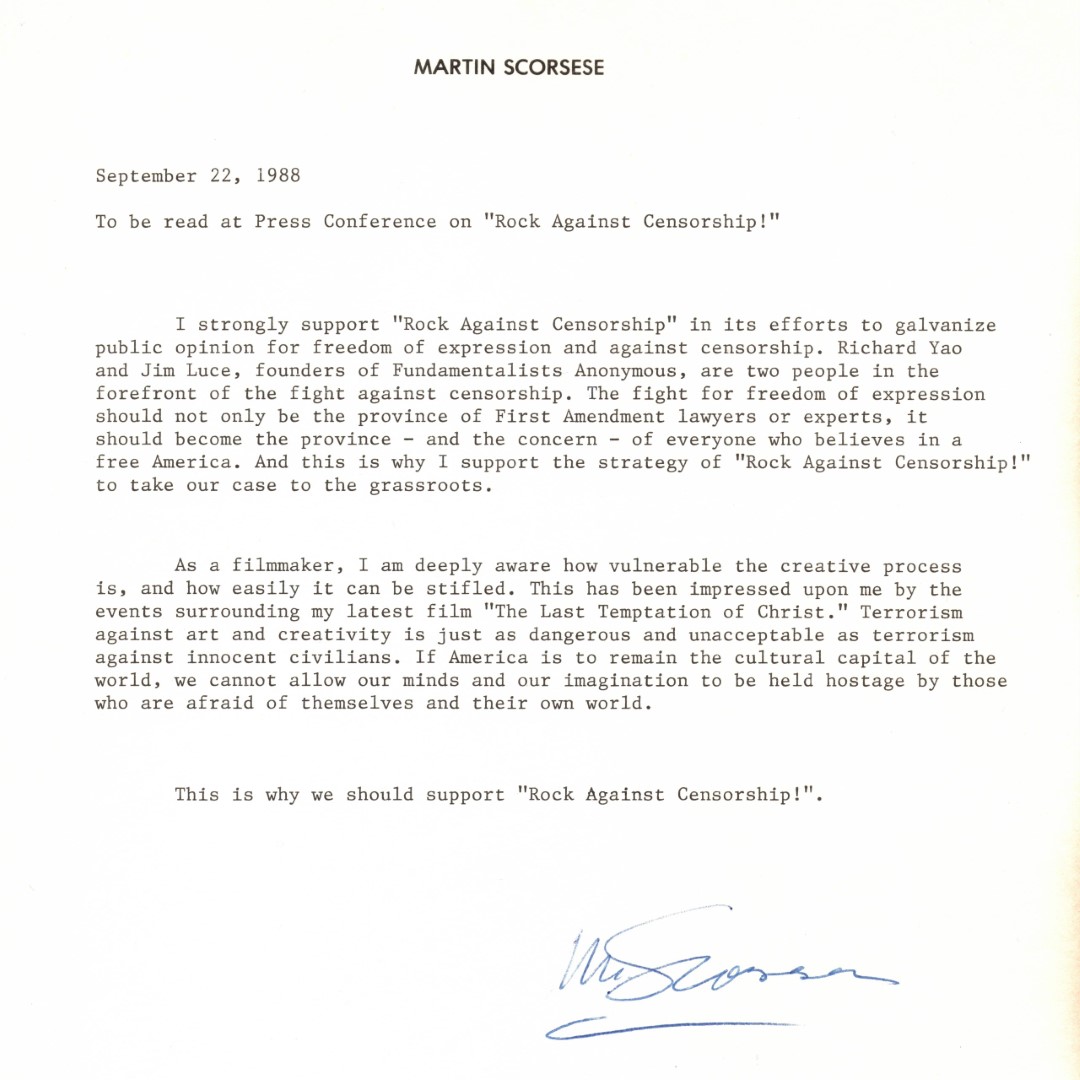 Last Temptation of Christ" title="Our Stand with Martin Scorsese’s Last Temptation of Christ" />
Last Temptation of Christ" title="Our Stand with Martin Scorsese’s Last Temptation of Christ" />The film delves into the psychological and emotional struggles of Jesus, portraying his temptations and doubts with a level of intimacy that is rarely seen in religious narratives. This humanization of Jesus made his ultimate sacrifice even more poignant and relatable. For us, this portrayal did not diminish his divinity but rather enhanced our appreciation of his humanity.
New York, N.Y. I first met Martin Scorsese when his publicist Josh Baran asked Fundamentalists Anonymous which I had co-founded to take a stand on Marty’s film, The Last Temptation of Christ with Willem Dafoe. At the private opening, at a theater on 23rd Street in Manhattan, Marty jotted me a thank you note/autograph. The film was not offensive at all, and my partner Richard Yao and I spoke widely on how, as Christians, we found the film to be sensitive and important.

Meeting Marty and engaging with his work on The Last Temptation of Christ was a significant moment for me, both personally and professionally. The film, based on the novel by Nikos Kazantzakis, explores the human aspects of Jesus Christ’s life and the struggles he faced.
For many, this portrayal was controversial, but for me, it was a profound exploration of faith and humanity. Marty’s depiction of Jesus as a man grappling with his divine mission resonated deeply with my Episcopal understanding of Christian faith, which acknowledges the complexities and trials of the human experience.
The uproar surrounding The Last Temptation of Christ largely stemmed from a misunderstanding of its intent. Fundamentalist groups protested the film, viewing it as blasphemous and offensive.
However, my partner Richard Yao and I recognized it as a respectful and thought-provoking piece that invited viewers to contemplate the duality of Jesus Christ as both human and divine. This perspective aligned with our mission at Fundamentalists Anonymous, which aimed to promote a more nuanced and compassionate understanding of faith, moving away from rigid dogmatism.
Our advocacy for the film involved speaking at various forums and engaging with the media to articulate why we, as Mainline Christians, did not find the film offensive. Instead, we emphasized how The Last Temptation of Christ opened a dialogue about the nature of Jesus’ sacrifice and the essence of Christian faith. Scorsese’s work encouraged believers to reflect on their own spiritual journeys and the personal challenges they face in living out their faith.
Meeting Marty Scorsese in person was an enlightening experience. His genuine gratitude for our support and his passion for the project were evident. The thank-you note and autograph he gave me at the film’s opening symbolized more than just a memento; it was a testament to our shared belief in the importance of honest and heartfelt storytelling. Marty’s approach to filmmaking, characterized by its depth and authenticity, mirrored our approach to faith—open, inquisitive, and deeply personal.

The Last Temptation of Christ was not just a film; it was a cultural touchstone that sparked important conversations about religion, art, and interpretation.
By defending the film, Richard and I positioned ourselves as advocates for a more inclusive and empathetic Christianity. We argued that faith should not be threatened by artistic exploration but should instead embrace it as an opportunity for growth and understanding.
Scorsese’s work has always been marked by its exploration of complex themes and characters, and The Last Temptation of Christ is no exception.
The film delves into the psychological and emotional struggles of Jesus, portraying his temptations and doubts with a level of intimacy that is rarely seen in religious narratives.
This humanization of Jesus made his ultimate sacrifice even more poignant and relatable. For us, this portrayal did not diminish his divinity but rather enhanced our appreciation of his humanity.
The collaboration with Marty and the support for his film were pivotal in challenging the monolithic interpretations of Christianity that often dominate public discourse.
We believed that faith could withstand scrutiny and that questioning and exploring one’s beliefs were vital to a vibrant spiritual life. The Last Temptation of Christ provided a platform for such exploration, encouraging believers to engage with their faith on a deeper level.
My experience with Martin Scorsese and The Last Temptation of Christ was profoundly impactful. It reaffirmed my belief in the power of art to challenge, inspire, and deepen our understanding of complex subjects like faith.
By standing up for the film, Richard Yao and I championed a vision of Christianity that is open, compassionate, and willing to engage with difficult questions. Scorsese’s film remains a testament to the enduring power of thoughtful storytelling and its ability to illuminate the human condition.
Our Stand with Martin Scorsese’s Last Temptation of Christ (May 24, 2013)
#MartinScorsese #LastTemptationOfChrist #FilmAndFaith #Christianity #ArtAndReligion #FaithExploration #CinematicArt #ReligiousDialogue #WillemDafoe #FilmAdvocacy #CulturalTouchstone #SpiritualJourney #InclusiveFaith
Tags: Martin Scorsese, Last Temptation of Christ, Film And Faith, Christianity, Art And Religion, Faith Exploration, Cinematic Art, Religious Dialogue, Willem Dafoe, Film Advocacy, Cultural Touchstone, Spiritual Journey, Inclusive Faith